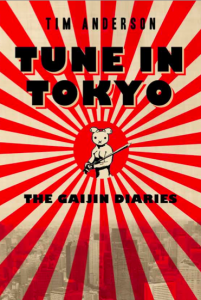 Andrew Sullivan posted an email from a reader – who we’ve reviewed and interviewed in the past – about his leap from self-publishing to AmazonEncore (which I didn’t know had happened, so congrats Tim!). He writes:
Andrew Sullivan posted an email from a reader – who we’ve reviewed and interviewed in the past – about his leap from self-publishing to AmazonEncore (which I didn’t know had happened, so congrats Tim!). He writes:
After finishing a first draft of the manuscript, I jumped through all the typical hoops: got an agent, wrote a fat book proposal, revised till my nose bled, this, that, the other. Ultimately, after several years of trying, my agent was unable to sell it because, even when editors were interested – and we did have a few big pubs on the line -the marketing departments would always veto its acquisition because they didn’t know how to market the thing (which I found completely laughable). Basically I needed to already be famous, then marketing could work its magic.
My agent – who did yeoman’s work on the manuscript and really functioned more as an editor – finally gave up and I moved on to my next project, but I couldn’t shake the feeling that there definitely was an audience for the book, so I self-published.
A few months later I managed to get a great review in Publishers Weekly’s inaugural PW Selects quarterly review of self-published titles. The review caught the eye of an editor at Amazon Publishing, who got the book and loved it, then contacted me about reissuing it in a new edition under the AmazonEncore imprint in order to bring it to a wider audience. (The self-published version was NOT a big seller.) I hesitated for a few seconds before shrieking “YES, YES, A MILLION TIMES YES! HURRY, WHERE DO I SIGN?” Nine months later the book was published again as a trade paperback and an e-book, with the full force of Amazon’s on-site (and some off-site) promotional support.
It seems to me this is kind of a phenomenon that is happening more and more often: author self-publishes then gets published for real, by whatever publisher. The twist in my case is that Amazon is now in the publishing game and is throwing bookstores and other publishers for a loop. They’ve got lots of customer data and can very effectively find readers for whatever books are out there, as we all know. This of course includes books that they themselves publish.
Additionally, now I find myself in the unusual position of starting to resent bookstores. Barnes and Noble is not stocking the book (though it can be ordered). And, because of their frothing hatred for Amazon, a lot of indie bookstores are refusing to stock the book as well; my own local bookstore in Greenpoint, Brooklyn – a place that loves to tout itself as a community bookstore focused on local authors – told me outright that they would not allow me to schedule a reading and would not stock the book because of the Amazon connection. I certainly understand the unease about Amazon on the part of small bookstores and such, but it just seems to me this is an idiotic, childish, and short-sighted way of going about things.
Here’s Sullivan’s take on the publishing industry:
I’ve been curious how this post has affected sales of the book – and it’s gone from a million rank to 100,000 for print and #217 for the Kindle. So publicity helps – despite what JA Konrath might say. At the very least, it has to be fun for Tim Anderson to be talked about on such a popular blog.
Get an Editorial Review | Get Amazon Sales & Reviews | Get Edited | Publish Your Book | Enter the SPR Book Awards | Other Marketing Services






















My favorite line here is “basically I needed to already be famous”. I heard that one many times myself as I tried the traditional path and piled up the rejections. I’m happy to say I too have self-published my novel, The Secrets They Kept, and while it hasn’t …yet…risen to the top of the charts, that’s what I and my marketing are working on.
Nothing is more frustrating than to have written a book that almost everyone loves when they read it, and yet publishers reject it outright.
I can only guess the reasons publishers didn’t like my book is this comment I get from many readers – “This book is unlike anything else I have ever read.” In fact a couple of people commented that they were Stephen King fans and like it better than anything he has ever written. I went “self published” back in September and have since had lots of reviews that solidify my belief that it’s a really good book.
Being that the story is so different, I guess publishers were just looking for more of the same.
So my book, The Spirit Box, has spawned a series of which I am currently writing the third book. Maybe one day Amazon will discover me too. Until then I am building my fan base and selling books all over the world. All from my desk at home.
I would tell publishers to wake up and smell the coffee, but they would probably tell me to look at their website and read their submission guidelines. To which I then reply:
Submission guidelines? We don’t need no stinking submission guidelines! We are the self published legion and we will overcome!
The same thing happened to me. A local bookstore had agreed to set up a book signing that would coincide with a magazine article coming out regarding my novel. The owners were hesitant to work with me at first because the paperback was only available through Amazon, but they finally decided that if I bought the books that were to be sold, it would be okay. Then I received an email that said since my book was being printed by Createspace, an Amazon subsidiary, they would not be able to host the event.
I understand that many independent book stores are having a hard time competing with such large corporations, but why take it out on self-published authors who have also been struggling for recognition and a fair shake by the publishing powerhouses? It seems like not only are these smaller book stores shooting themselves in the foot, but they are directing their frustration in the wrong direction. After all, when I reached out to my local store, I was helping to bring them business, not take it away.